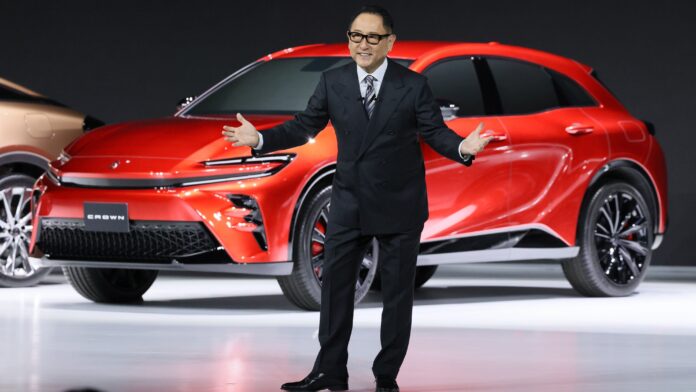The president of Toyota has doubts about whether automakers and consumers are ready for a full shift to electric vehicles, pointing to what he believes is growing discomfort with the trend.
“That silent majority is wondering whether EVs are really OK to have as a single option,” Akio Toyoda told reporters on a visit to Thailand over the weekend, the Wall Street Journal reports(Opens in a new window). “But they think it’s the trend so they can’t speak out loudly.”
Electric vehicles made up 6% of new car sales this year in the US and 18% in California, Electrek reports(Opens in a new window). The fast rate of adoption, plus success from all-EV rivals like Tesla and Rivian, has pushed most of Toyota’s competitors to set dates for when they will no longer sell gas-powered cars, including General Motors (2035) and Honda (2040), among others.
2023 Prius Prime plug-in hybrid
(Credit: Toyota)
GM is seeing record sales of its $26,000 all-electric Chevy Bolt, and Ford’s F-150 Lightning electric pickup truck is flying off the line faster than it can be produced—even with a 40% price increase this year. That said, both companies continue to earn most of their profits from gas-powered SUVs and trucks while they work to streamline EV materials costs and scale production.
But Toyota is not yet plotting a full transition to EVs. It plans to mostly stick to its hybrid roots, made famous by the Prius, while exploring other options, including hydrogen fuel cell vehicles. “Because the right answer is still unclear, we shouldn’t limit ourselves to just one option,” says Toyoda.
The Japan-based automaker currently offers just one fully electric SUV, the bZ4X(Opens in a new window), as well as one fuel-cell vehicle, the Mirai(Opens in a new window). Fuel cell vehicles also run on batteries, but the electricity is generated from a hydrogen reaction instead of pulled from the electrical grid.
Ten hybrid models make up the majority of Toyota’s lineup, plus two plug-in hybrids (including the popular Rav-4 Prime SUV(Opens in a new window).) In November, Toyota unveiled the 2023 Toyota Prius hybrid and Prius Prime plug-in hybrid, which feature a sportier, more futuristic design.
Recommended by Our Editors
2023 Toyota Mirai, a hydrogen fuel cell vehicle
(Credit: Toyota)
Environmentalists may balk at Toyoda’s suggestion of moving even slower on EVs, as hybrids only use a small portion of battery power and still emit tailpipe emissions like gas-powered cars, even if they typically have roughly double the miles per gallon. The fast rate of EV adoption is still not enough to curb climate change, some studies have found. Plug-in hybrids are better, as they go a certain number of miles (around 30 on newer models) on electricity before switching to gas.
But both regular hybrids and plug-in hybrids have the advantage over fully electric vehicles of not needing to rely on the fledgling charging infrastructure currently in place in the US. Even if that improves, as it will thanks to billions of dollars in federal funding as well as private investments from GM and other automakers, Toyoda says EVs are not the only way to reduce emissions.
Hybrids sold in large volumes can deliver meaningful short-term impact and “it’s about what can be done now,” he argues.
Like What You’re Reading?
Sign up for Tips & Tricks newsletter for expert advice to get the most out of your technology.
This newsletter may contain advertising, deals, or affiliate links. Subscribing to a newsletter indicates your consent to our Terms of Use and Privacy Policy. You may unsubscribe from the newsletters at any time.
Hits: 0

















